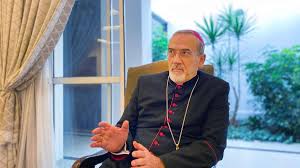As the pope’s subordinate in Jerusalem, Pierbattista Pizzaballa has one of the most delicate jobs in Catholicism
From the moment Pope Francis appointed a Franciscan friar as Jerusalem’s Latin patriarch last year the new appointee has had his work cut out.
Italian archbishop Pierbattista Pizzaballa took the job in November as the coronavirus ravaged his flock in Israel, the Palestinian territories, Jordan and Cyprus.
Catholic schools and hospitals faced a liquidity crunch. Many Christians, like Muslims, saw their incomes plummet, and resorted to savings that have been running out, he told The National.
Israeli transgressions in occupied territories increased and the region remains affected by aftershocks of the Arab uprisings a decade earlier.
“All around Jordan the situation is catastrophic,” the archbishop said on a visit to Amman, pointing to the civil war in Syria, financial meltdown in Lebanon and the failed uprising in Iraq.
For centuries, a main job of the archbishop, or patriarch, has been to preserve the shrinking Christian community and forge good ties with the Muslim community.
Emigration of Christians has not stopped for decades and the temptation to leave is always there
Pierbattista Pizzaballa
Mr Pizzaballa needs to maintain channels with temporal authorities without the church appearing aloof to the aspirations of the people.
It involves a fine balance between pragmatism and Christian ideology, parts of which are strongly supportive of the impoverished and disenfranchised.
Mr Pizzaballa is on his first trip as archbishop to Jordan, which has a 2 per cent Christian population.
The Royal Palace said King Abdullah spoke with the archbishop two weeks ago about “the important role of the Latin Patriarchate and other churches in Jerusalem in bolstering the unity of Jerusalemites.”
Jordan, which has a population of 10 million, acts as custodian of holy places in East Jerusalem. The country has mostly avoided large anti-regime demonstrations, similar to ones that ushered in the Arab uprisings a decade ago.
While the church sympathises with popular demands for justice and accountability, the protest movements need to produce a leadership and remain peaceful, he said.
“We saw that the uprising movements did not produce leadership to be able to transform people’s expectations politically,” Mr Pizzaballa said.
Although the church has historically favoured stability in the Middle East and elsewhere, he said that this position does not justify bad government.
He pointed out Philemon, a prison letter by Saint Paul that forms part of the New Testament. In the letter Saint Paul sends a runaway slave back to his master. But he tells him to treat the slave “as a beloved brother”.
The tall, slender archbishop said the Christian way is “to change the attitude of society and conquer the hearts of the people, not the power”, cautioning that such an approach “is not always successful.”
Mr Pizzaballa, 55, is from northern Italy and was ordained as a priest three decades ago in Bologna. He is a specialist in Hebrew, coming from a Franciscan tradition of high education.
His demeanour is austere, and he speaks gently but firmly. Speaking in English, the archbishop chose his words carefully.
There are about 46,000 Christians in the occupied West Bank and Gaza, 120,000 in Israel, and 10,000 in Jerusalem, where tension for centuries marked ties between the different Christian sects.
But the archbishop said many families in Jerusalem are mixed and relationships between the different Christian communities have been mostly harmonious for the last few decades.
Since the coronavirus struck last year, he said concerns of Christians in the region have been primarily economic.
“Many people are not working. No one believes that life could resume immediately,” he said, referring to a possible end to the pandemic.
“We had Intifadas. We had wars and a lot of Middle East turmoil but not a situation where everything is paralysed, for Christians and Muslims,” the archbishop said.
The Palestinian situation is particularly “dramatic”, with places such as Bethlehem hit hard by the absence of tourists, he said.
Economic hardship, together with rise of militancy has caused significant Christian migration from the Middle East since the 1970s.
This time, Europe, the US and Canada, where the bulk of Arab Christian migrants had gone, may be less open to receiving a new wave.
“Emigration of Christians has not stopped for decades and the temptation to leave is always there,” he said.
But the coronavirus has made “the situation difficult in western countries, and the possibilities to emigrate are becoming more complicated.”
Source: thenationalnews.com







